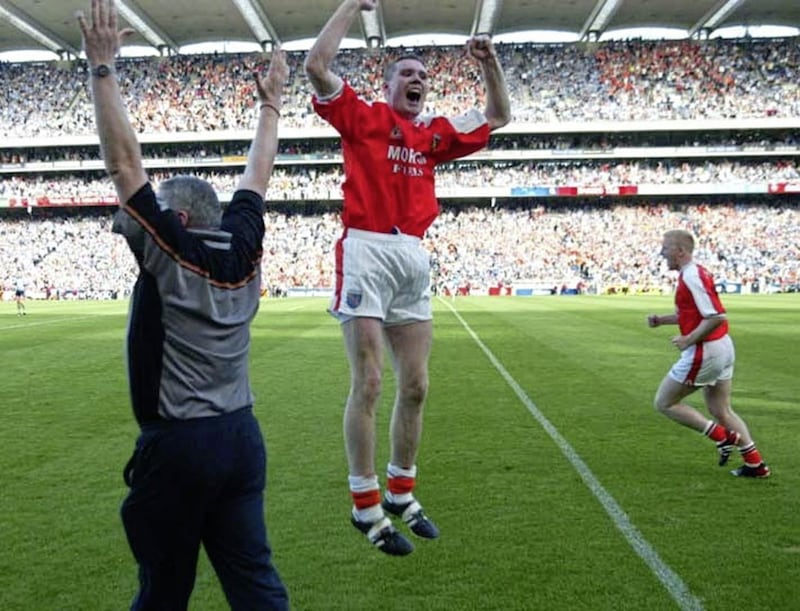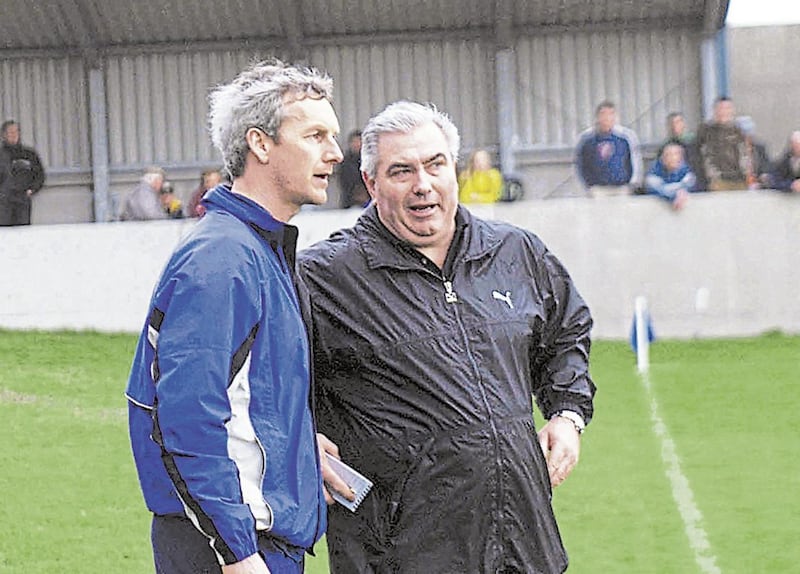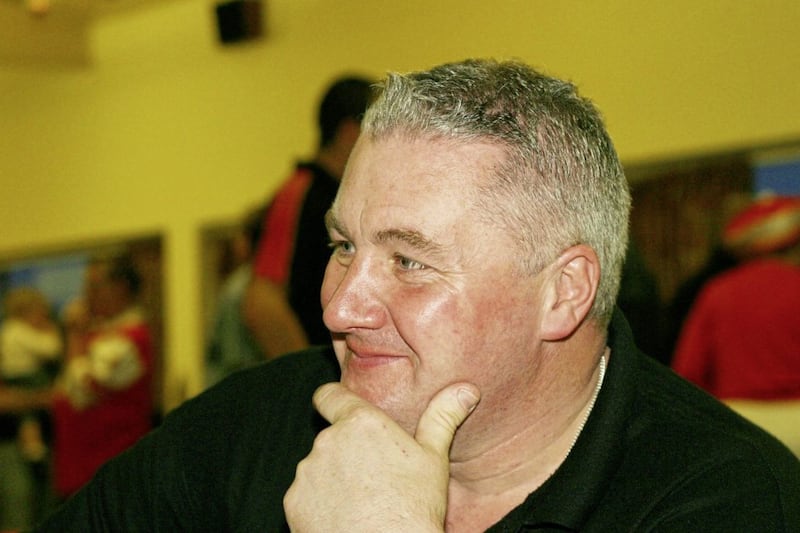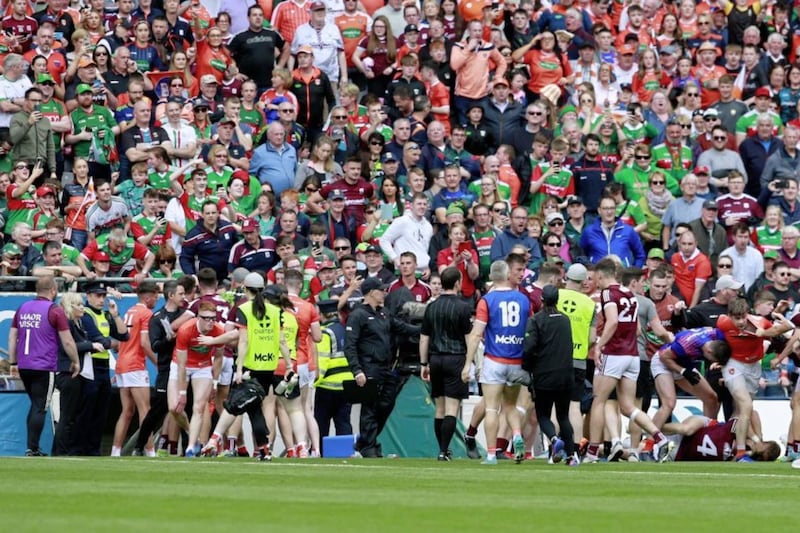PAUL Grimley is in the lobby area of the Armagh City Hotel. It’s a bright Monday morning. He’s early. I’m late.
Wearing a wide smile, the Pearse Og man’s handshake is strong and welcoming.
It’s eight years since we last saw him on the side-lines - a narrow All-Ireland quarter-final defeat to Donegal in Croke Park, a stage the county side returns to this weekend for only the second time since 2014.
It’s hard to believe Grimley was only 43 when he helped lead his native county to the Promised Land in 2002 alongside manager Joe Kernan.
Big, gregarious, affable as ever, he doesn’t look 20 years older.
“But it does feel 20 years ago,” he smiles.
“It’s great to reminisce, you meet up with the players now and again, you’re looking back laughing and joking at some of things that happened.
“But you realise your life is in stages. That was a stage of my life and you gradually move on. Other things come into your life, like grandchildren and they become the ultimate thing.”
He has five grandkids and twins are on the way. He rhymes off their names and ages: Jack (5), Matthew (7), Éabha (8), Clara (10) and Caiomhín (17).
They’re all into their football, either at Armagh Harps or Pearse Og.
“I don’t care who the grandkids play for, as long as they’re happy and stay healthy. I’m just glad they’re playing.
“Every morning I wake up, I thank God I have them, and they are the last thing I think about going to bed at night… A man should only worry about how his family turns out...”
He lost his sister Brenda and mum, Rita, in the space of 11 months between February 2020 and January 2021. Both Brenda and Rita loved their football.
Working in special purpose insurance underwriting, Grimley’s mobile phone buzzes to Elvis music.
Once he handed the managerial reins over to Kieran McGeeney at the end of the 2014 season, Grimley knew he was done with management.
“I never put on another boots after that. That’s the way I left it and that’s the way I wanted to leave it.”
No regrets.
It was fitting the side-line he last patrolled was the greatest stage of them all.
“Football for me now is as a supporter. It’s a social event. I go to Armagh’s games with all my mates from Pearse Ogs. There are about 12 of us and we go on a bus to the games. If it’s far away, we’ll stay overnight and have the craic.
“Nowadays, going back home on the bus, I know I’m not going to be blamed for a bad result!” he laughs.
“That’s the luxury that you don’t have when you’re the manager. I know what’s going through Kieran’s [McGeeney] head if Armagh lose a game because I’ve been there. You think of every tactic, every ball, every missed chance… all those things are going through your head.
“The next day you watch the videos; it takes you the best part of a week to get over a defeat. You are company for nobody because you’re consumed by it. It’s like you’re in this dark room you want to get out of.”
So, why do it?
“Why do it? To test yourself,” he says. “And to look back and say you were manager of a county team and you were there on merit.”
After losing an Ulster semi-final replay to Monaghan in 2014, Armagh embarked on a memorable run in the All-Ireland Qualifiers, taking the scalps of Roscommon, Tyrone and Meath.
“Armagh had never beaten Tyrone in Healy Park for I don’t know how long, and I remember going over to Mickey Harte after the game and saying: ‘This is a change!’ And he just said: ‘You deserve it.’”
Paul Grimley’s involvement in Gaelic football that straddles four decades has been nothing short of epic.
He was part of the first Pearse Og team to win a senior championship in 1985 before they grabbed another in ’88.
He went on to manage his club and spent five fruitful years with Armagh between 2002 and ’06.
He enjoyed success with DCU, Clontribret and had coaching spells with Kildare, Cavan, Monaghan and Meath before returning to his native county and helping and then succeeding Paddy O’Rourke in 2013.
But his legacy will always be with Armagh’s class of ‘02.
In the few years leading up the county’s greatest triumph, Brian McAlinden and Brian Canavan couldn’t have gone any closer to reaching the Holy Grail.
Joe Kernan and Grimley were fresh and probably improved each other when Crossmaglen Rangers and Pearse Og collided in the club championship.
“Joe had three years with ‘Cross before he won anything. We beat them twice in the previous three years when I was managing my club...
“Then came along the McEntees [John and Tony] and one or two others and suddenly things changed because these boys could deliver long, diagonal balls into Jim McConville, with Oisin [McConville] on the half-forward line.
“These boys were capable of picking a ball up in the middle of the field and driving 60 or 70 yard passes – and that changed the game. ‘Cross would leave just one or two men inside.
“Of course, they won a lot of games by a point or two because of Oisin. They went on to win the All-Irelands that they did and Joe deserved the Armagh job, not a question about that and went on to win the All-Ireland in his first year with Armagh. His stock went through the roof.”
Players like Diarmaid Marsden, Kieran McGeeney, Justin and Enda McNulty, Andy McCann, Oisin McConville and Paul McGrane carried the hurt of bitter Championship defeats into ’02.
But what Grimley vividly recalls are the fine margins and how the course of history could easily have steered in an entirely different direction 20 years ago.
Had Tyrone’s Richard Thornton taken his chance in the dying embers of their Ulster quarter-final, Armagh wouldn’t have won the All-Ireland.
As it transpired, the Orchard men won the replay – thanks to goals from John McEntee and Barry Duffy - and went on to win their third Anglo-Celt in four years.
“As the summer went on we increased the intensity and got stronger. Now, we’d luck with Sligo in the All-Ireland quarter-final; they could’ve finished the job.
“We had luck with Ray Cosgrove’s free that hit the post in the semi-final [against Dublin]. I thought we were going for a replay. They were such fine lines...
“If the two Brians had a shade of that luck they probably would have won the Sam Maguire. Remember, they were beaten narrowly in some big games.”

While he got an awesome adrenaline rush from each of Armagh’s eight Championship games during that perfect summer, which ended with a tumultuous All-Ireland final win over Kerry, Grimley loved the training field just as much.
That’s where camaraderie was nurtured and life-long friendships conceived.
Over the years, Armagh’s tackling drills have assumed legendary status, especially when Marsden and ‘Geezer’ were in the grid. It was “tough – repetitively tough”.
“I think Paul wanted to push us to see how much we could absorb,” says John McEntee, one of the undoubted stars of ’02.
“We wanted to push harder and harder every time. We’re probably all suffering for it now – but it was great fun looking back on it. I enjoyed every minute of it.”
Grimley insists Armagh at the time had “no huge tactical strategy” other than to move the ball quickly and directly into their inside line.
“We kept doing what we did best.”
After capturing Sam and four Ulster titles, Grimley parted company with Armagh in 2006 but harboured hopes of returning to manage his native county.
Kernan stayed on for one more year but the ’07 Championship campaign lasted just two games – a pair of defeats to Donegal and Derry.
The Glory Days had come to a shuddering halt once Ballinderry’s Collie Devlin slung over the winning score in Clones.
Grimley helped out Donal Keogan for a year in Cavan and later hooked up with McGeeney in Kildare for two seasons.
“I loved Kildare. I should have stayed longer. We got to the Leinster final in 2009. We played outstanding football.
“The travelling was a big factor back then. You were up and down the road three or four times a week. Leaving here at four o’clock, getting a bite to eat before training, leaving training at half-nine, 10 o’clock, getting home at 12.30 at night. The next day I’d be like a wet rag. I had an insurance business at the time and it was just too much.”
As Monaghan’s coach in 2010, he remembers the snide comments from a few Armagh supporters heading into Casement Park for an Ulster quarter-final and the Farney men giving his native county a footballing lesson.
He stuck with Seamus ‘Banty’ McEnaney and a year later the pair landed in Meath – a footballing county where discord was never in short supply.
‘Banty’ stayed on for a second season in the Royal County while Grimley returned to assist Paddy O’Rourke in Armagh.
When O’Rourke stepped down at the end of the 2012 season Grimley became Armagh manager and held the post for two seasons.
“I would have regretted it had I not managed Armagh because it was unfinished business with me,” he says.
“I felt it was my destiny to manage them at some stage. I would love to have got it back in 2006, but didn’t. Getting it seven or eight years later, it was still the job and I still wanted to be on the side-line with Armagh.”
Despite the Armagh senior team being in the throes of deep transition, former RTE football pundit Joe Brolly questioned Grimley’s tactics on RTE and openly doubted the Pearse Og man’s ability to do the job.
Specifically, Grimley was annoyed at the Derry man for referencing his two brothers and former Armagh stalwarts Mark and John in his blunt analysis.
Almost a decade on, Grimley has mellowed somewhat but adds: “Of course it hurts you when he talked about the brothers. When Brolly was running around blowing kisses, they were representing Ireland.
“He sat in a studio criticising people and teams and the ironic thing was he mentioned how hurt he felt after his time with RTE ended. I just felt some of his comments were insulting.”
Nevertheless, Grimley acknowledges he enjoys Brolly’s political musings and feels that’s where his strengths lie.
“I’d read Brolly’s non-football related articles and I actually think he’s very, very good.
“I think there’s a career in Stormont for him as an independent. He says he’s not interested in politics. I find that hard to believe… he’s very much to the point and he gets it across very, very effectively and can be a voice for those who don’t have one.
“You can’t turn around and criticise somebody all of the time because they criticised you in the past. You put that aside. This guy is a really good writer, he talks well, he has beautiful vocabulary. I would love to see him having a debate with someone like Jim Allister…”
The morning has sloped into early afternoon in the hotel’s lobby area. Grimley’s mobile phone buzzes on and off but he’s stopped answering it.
He remains one of Kieran McGeeney’s most loyal supporters and is looking forward to boarding the supporters bus with his mates from Pearse Og and enjoying Armagh’s next adventure this weekend.
He strikes you as a man who lives in the present but enjoys gazing into his rear view from time to time.
Twenty years have passed since that swaying, heaving orange mass commandeered the Croke Park pitch to celebrate their heroes.
Twenty years. Gone in a blink of an eye. Time is a ruthless line.
“For me, the joy was in the journey itself. The journey was probably better than the arrival.
“We got through a few replays and got a few narrow wins. We went to La Manga where we had a fantastic training week. There wasn’t a drop of alcohol taken the whole time, and credit for that goes to Joe and John [McCloskey] because they were the instigators of it. John went out ahead and got everything ready. He was tremendous in that week.
“There was a great rapport between us all... While we trained hard and everything was done to a really high level, we had serious fun among ourselves, the jokes and pranks. I pranked John quite a bit.

“I remember saying to the players when we were leaving La Manga: ‘We all know this will not last forever and we’ll eventually go our own separate ways but while we’re here we’re duty-bound to do as well as we can and win as much as we can. Not only for us, but for our families, the people who have been with you through heartbreak…’”
“But, for me, the most memorable moment with Armagh was standing together on the side-line before the All-Ireland final. In that moment, I just felt this was like a family-orientated team, a team that you could hear their hearts beating.
“You were thinking: ‘Jesus, let none of them be the cause of a defeat. Let them all play well.’ As you would do for your own son.
“You’ve got your arms around each other in those few moments before the final, just before going into battle; everybody had each other’s back. Standing for the national anthem we were one...
“And of course winning it and getting up on the podium and looking down at the sea of orange. I remember thinking: ‘My God – this is what we’ve done.’
“We went to the graveyard on the Tuesday or Wednesday after the final and to see another sea of orange on the graves…
“There were so many requests to bring the cup to places. When you brought it into a person’s house who might’ve been ill or terminally ill and the whole family was there and they had the Armagh regalia all around the house and they were waiting for you to bring the cup in...
“You saw men of maybe 90 years of age crying their eyes out. And maybe their daughter is telling you it was the first time they ever saw their father cry. That kind of thing has a serious impact on you.”
For now, though, Elvis echoes all around the lobby area and the coffee’s run dry.
This trip down memory lane is paused and the daily grind of answering calls and attending meetings has to resume.
“Joe and Paul came in with a real energy and enthusiasm,” John McEntee says.
“Anything that was asked of me, I did…that type of old-style people-management; they just knew how to work people and get the best out of them. We believed in them.
“Sometimes you looked at Joe and Paul and you thought they were going to have a heart attack because it would take so much out of them. They were so invested in it. I knew it meant as much to them as it did to me – and that was so important.
“The methods back then were very different. They were more human methods compared to how it works today.
“What I remember most about Paul is that big smile on his face and him putting the arm around you. You’d forget about the 10 things you did wrong that day and he’d remind you of the one that you scored or the pass you made.
“They were glory days, no doubt about it. They were some of the best years of my life and having the ability to pick up the phone to Paul, if I ever needed to, means so much.
“I don’t know teams today would have the same affection for their manager years later. I think that friendship and camaraderie I had with Paul and Joe and the rest of the boys will never be surpassed.”









